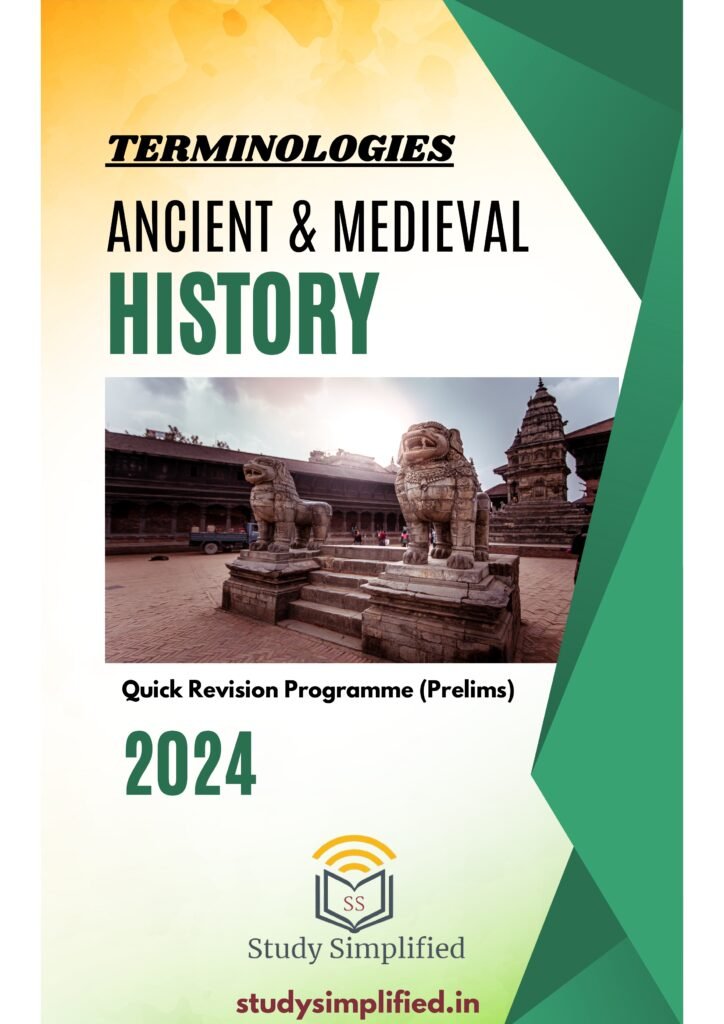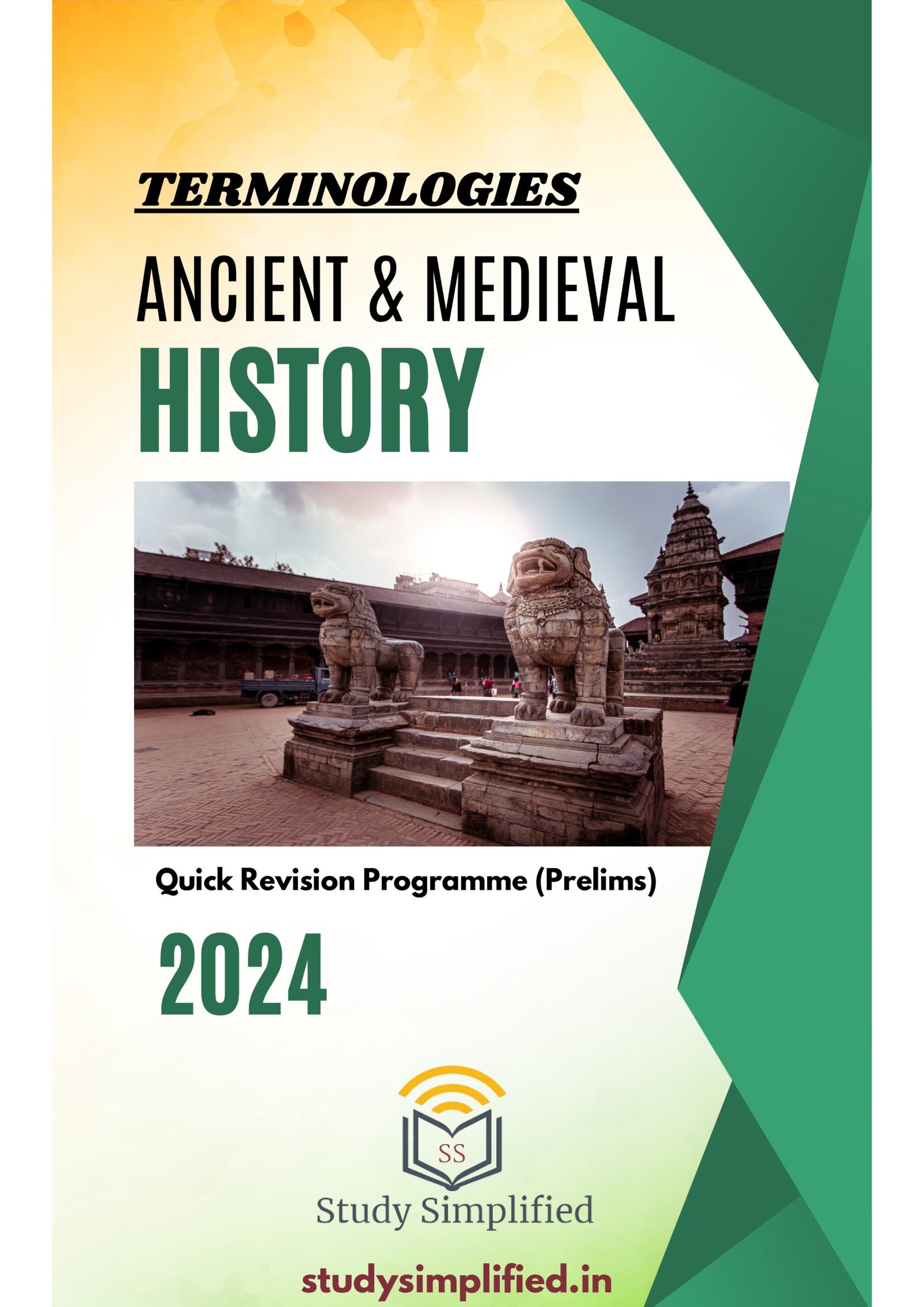Key Terms in Ancient and Medieval History: A Comprehensive Guide for UPSC IAS Exam

About the Book Key Terms in Ancient and Medieval History
“Terminologies: Key Terms in Ancient & Medieval History” is an indispensable resource meticulously crafted to cater to the specific needs of UPSC Civil Services (Official Webpage – https://upsc.gov.in/ )aspirants. Designed as a comprehensive guide, this book delves into the essential terminologies, events, and themes that form the bedrock of ancient and medieval Indian history.
Key Features:
- Concise Overview: The book provides a concise yet comprehensive overview of crucial terminologies spanning ancient and medieval Indian history. From the Vedic period to the Mughal era, each epoch is examined with clarity and precision.
- Exhaustive Coverage: With a keen focus on the requirements of the UPSC syllabus, this book covers a wide array of topics ranging from socio-cultural dynamics to political structures, economic systems, religious movements, and more. It ensures that aspirants are well-equipped to tackle any question related to the subject.
- Clarity and Accessibility: Complex historical concepts are elucidated in a manner that is both accessible and engaging. The language is lucid, enabling aspirants to grasp intricate ideas with ease, irrespective of their prior familiarity with the subject.
- Strategic Insights: In addition to elucidating key concepts, the book offers strategic insights into how to approach historical questions in the UPSC exam. It provides tips on effective answer writing, topic prioritization, and critical analysis, empowering aspirants to excel in the examination.
- Illustrative Examples: To aid comprehension, the book includes illustrative examples, case studies, and timelines that contextualize key terminologies within the broader narrative of Indian history. This holistic approach not only enhances understanding but also fosters a deeper appreciation for historical dynamics.
- Updated Content: Keeping pace with the dynamic nature of UPSC exams, the book incorporates the latest developments, research findings, and historical interpretations. It ensures that aspirants are equipped with up-to-date knowledge to tackle contemporary questions with confidence.
Chapters: Key Terms in Ancient and Medieval History
Ancient History Terminologies
1. Vedic Age
2. Magadhan Age
3. Mauryan Age
4. Satavahanas
5. Guptas
6. Harsha Period
7. Sangam Age and Cholas
8. Miscellaneous
Medieval History Terminologies
1. Slave Dynasty
2. Khilji Dynasty
3. Tughlaq Dynasty
4. Lodhis
5. Administration Related Terms During Sultante Period (Slave Dynasty to Lodhis)
6. Vijayanagara Empire
7. Religious Movements
8. Mughul Empire
9. Shershah Suri
10. Shivaji’s Ashtapradhans
Importance of Reading Key Terms in Ancient and Medieval History
- Understanding Historical Context: Mastery over key terms helps candidates grasp the historical context of ancient and medieval India. This understanding is fundamental for comprehending the socio-political, economic, and cultural dynamics of different historical periods.
- Scoring in General Studies Paper: Ancient and medieval history is a significant portion of the UPSC General Studies Paper. Familiarity with key terms enhances candidates’ ability to answer questions accurately and comprehensively, thereby improving their chances of scoring well in this section.
- Interdisciplinary Understanding: History is intertwined with various other disciplines such as geography, economics, and sociology. Key terms in ancient and medieval history provide a foundational understanding that aids in comprehending interdisciplinary aspects and forming holistic perspectives on historical events and phenomena.
- Analytical Skills Development: Studying key terms necessitates critical analysis and evaluation of historical events, figures, and concepts. This process hones candidates’ analytical skills, enabling them to assess historical developments from multiple perspectives and draw informed conclusions.
- Enhancing Answer Writing Skills: UPSC exams demand precise and well-structured answers. Mastery over key terms enables candidates to articulate their thoughts coherently and concisely, thereby enhancing their answer writing skills and maximizing their chances of scoring higher marks.
- Cultural Heritage Preservation: Ancient and medieval history encompasses India’s rich cultural heritage and legacy. By studying key terms, candidates develop an appreciation for the diverse cultural, artistic, and architectural aspects of Indian history, contributing to the preservation and promotion of cultural heritage.
- National Identity and Citizenship: Understanding ancient and medieval history fosters a sense of national identity and citizenship among aspirants. By delving into India’s historical past, candidates develop a deeper connection with their country’s heritage and legacy, thereby reinforcing their commitment to serving the nation as civil servants.
- Policy Formulation and Governance: Historical knowledge, including key terms, informs policy formulation and governance. Understanding past events and their implications equips civil servants with valuable insights for addressing contemporary challenges and formulating effective policies conducive to national development.
Also Find posts on Similar Topic of Ancient and Medieval History (Click Here)
An Appeal
Dear Readers/Students Community,
An Appeal to you all,
Read Online Only available currently to support us.
You can Read this Book by only accessing this Page.
Kindly support our hard work to motivate Hard Working needy students like you.
So Please VISIT to OUR WEBPAGE REGULARLY
Enjoy the Reading for free and prepare well for your Exams.
𝓦𝓪𝓲𝓽 𝓯𝓸𝓻 𝓶𝓸𝓻𝓮 𝓲𝓷𝓽𝓮𝓻𝓮𝓼𝓽𝓲𝓷𝓰 𝓐𝓻𝓽𝓲𝓬𝓵𝓮𝓼.

[…] Key Terms in Ancient and Medieval History – https://studysimplified.in/key-terms-in-ancient-and-medieval-history/ […]